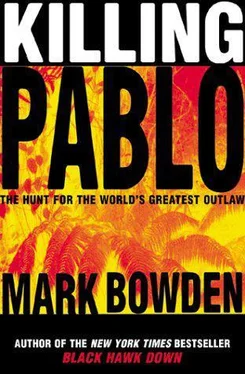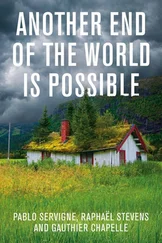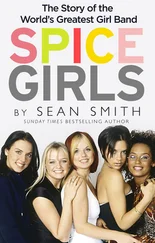Mark Bowden - Killing Pablo - The Hunt for the World's Greatest Outlaw
Здесь есть возможность читать онлайн «Mark Bowden - Killing Pablo - The Hunt for the World's Greatest Outlaw» весь текст электронной книги совершенно бесплатно (целиком полную версию без сокращений). В некоторых случаях можно слушать аудио, скачать через торрент в формате fb2 и присутствует краткое содержание. Жанр: Старинная литература, на английском языке. Описание произведения, (предисловие) а так же отзывы посетителей доступны на портале библиотеки ЛибКат.
- Название:Killing Pablo: The Hunt for the World's Greatest Outlaw
- Автор:
- Жанр:
- Год:неизвестен
- ISBN:нет данных
- Рейтинг книги:3 / 5. Голосов: 1
-
Избранное:Добавить в избранное
- Отзывы:
-
Ваша оценка:
- 60
- 1
- 2
- 3
- 4
- 5
Killing Pablo: The Hunt for the World's Greatest Outlaw: краткое содержание, описание и аннотация
Предлагаем к чтению аннотацию, описание, краткое содержание или предисловие (зависит от того, что написал сам автор книги «Killing Pablo: The Hunt for the World's Greatest Outlaw»). Если вы не нашли необходимую информацию о книге — напишите в комментариях, мы постараемся отыскать её.
Killing Pablo: The Hunt for the World's Greatest Outlaw — читать онлайн бесплатно полную книгу (весь текст) целиком
Ниже представлен текст книги, разбитый по страницам. Система сохранения места последней прочитанной страницы, позволяет с удобством читать онлайн бесплатно книгу «Killing Pablo: The Hunt for the World's Greatest Outlaw», без необходимости каждый раз заново искать на чём Вы остановились. Поставьте закладку, и сможете в любой момент перейти на страницу, на которой закончили чтение.
Интервал:
Закладка:
Killing Pablo
By Mark Bowden
Morris D. Busby, the U.S. ambassador to Colombia, was awakened by two phone calls early Wednesday, July 22, 1992, at a house in Chevy Chase, Md., where he and his wife were staying with friends.
The first call was to inform him that Colombian President Cesar Gaviria had finally decided to move the drug outlaw Pablo Escobar to a new prison, something Busby had been urging for more than a year. Shortly after that call came another, telling him that Escobar had somehow escaped through an entire brigade of the Colombian army.
The ambassador had spent too much time in Colombia to be surprised. He cut his vacation short and, within hours, flew back to Bogota.
Busby believed this bad turn of events for Colombia might be just the break he needed. Ever since he had been assigned to the embassy in Bogota the previous year, handpicked for the assignment in large part because it had become so dangerous, Busby had been eager to make an example of Escobar, but was frustrated by the drug boss' deal with the government.
The most notorious drug trafficker in the world had been perched on a spectacular Andes mountaintop, running his cocaine business surrounded and protected by the Colombian army. Current estimates were that 70 to 80 tons of cocaine were being shipped from Colombia to the United States every month, and Escobar controlled the bulk of it.
Inside his custom prison, Escobar lived like a sultan. There were parties with gourmet food and booze, beauty queens and whores. There were drugs, water beds and elaborate sound systems. Escobar ran his narcotics empire by phone. He ordered the murders of anyone who crossed him - including two of Escobar's onetime associates who were tortured and killed inside prison walls - according to one account, hung upside down and bled like steers.
At the presidential palace in Bogota the day of Escobar's escape, Busby found President Gaviria pacing in his office with fury. Gaviria had been up all night receiving one outrageous report after another: No assault had been made on the prison during daylight, despite Gaviria's orders. His vice minister of justice and his Bureau of Prisons chief had gone in themselves without authorization to talk with Escobar, and both had been taken hostage. And, finally, the worst of all scenarios had played out: Escobar had vanished.
It had taken more than two years, hundreds of lives, and hundreds of millions of dollars - much of it from U.S. covert funds - to hound the murderous drug billionaire into his surrender. Now, in one night, it had all come undone.
Waiting with Busby through the president's lamentations were Joe Toft, the flinty Drug Enforcement Administration office chief, and Bill Wagner, the "political secretary" who was in fact Bogota's CIA station chief.
"An entire brigade!" Gaviria shouted in amazement. "And the general allows two officials inside the prison to talk to him! For what? To notify him that he was going to be taken? What did he expect would happen? Such a stupid thing! I mean, such a stupid thing!"
Gaviria was fed up. For many long months, he had resisted the entreaties of the U.S. government. He had tried to control Escobar on his own. Now everything had changed. The time had come, he had decided, to call in the Americans.
The agreement that had landed Escobar in his prison suite at La Catedral the year before was a masterpiece of duplicity. A man with the blood of thousands on his hands was allowed to plead guilty to having introduced his cousin to a man who had arranged a single drug shipment overseas. Escobar was to serve a prison term and emerge a free man, all sins forgiven.
The length of the term was undetermined because prosecutors were allowed to add new charges if they obtained evidence of further crimes - not likely, for witnesses against Escobar typically were either bribed or murdered. In return, the government agreed not to extradite Escobar to the United States.
Everyone knew La Catedral was no prison. Escobar had paid to have it built on the site of one of his favorite resort hideaways near Medellin. His fellow prisoners were his cronies. He exercised a commanding influence over the local government of Envigado, where it was built, and Medellin, the booming northern city that was the base of his drug empire. In its eagerness to strike a deal with Escobar, Bogota had ceded virtually all authority for the "prison" to these locals.
La Catedral was legally a state within a state. The national police, who had lost hundreds of officers to Escobar's assassins, were forbidden to come within 12 miles of the prison. Concerned that American Special Forces or CIA agents might descend from helicopters, Escobar asked the provincial government to close the air space over the jail, which it did. Army guards fired on any aircraft that encroached.
Escobar's surrender in 1991 had allowed Gaviria to claim a political victory. Not only was the drug boss behind bars, at least technically, but the long and bloody bombing campaign directed by Escobar and his fellow narcos had been halted. Thousands of Colombians had died. Millions lived in terror. The country was exhausted by violence.
But now, a year later, Gaviria had decided to move Escobar to an actual prison on a military base in Bogota, a two-hour helicopter ride from Escobar's power base in Medellin. The president was embarrassed by newspaper exposes of Escobar's lavish life behind bars. And he was under pressure from the Americans, who had covertly pumped millions of dollars into the Colombian police pursuit of Escobar that had helped compel his "surrender."
At the presidential palace in Bogota, in front of the American ambassador and his top staff, Gaviria vented his frustration about Escobar's escape and the army's failure to stop him.
"Such a stupid thing!" he said.
The president was exasperated. He had been living with the threat of Pablo Escobar for years. During his entire campaign for president in 1989, he had expected to be killed by the drug boss. Escobar had tried several times to kill him. Gaviria had taken the place of front-running presidential candidate Luis Galan - Gaviria's good friend - after he was assassinated by Escobar's hit men.
Once he was elected, Gaviria's fondest hope was for the Escobar problem to just go away, at least for a while. Colombia was rewriting its constitution, an enormously important and historic task that could establish a stable and peaceful undergirding for the nation for the first time since civil war, La Violencia, had erupted more than 50 years before.
The last thing Gaviria needed was for Escobar to be running loose again, setting off his truck and car bombs and unleashing his sicarios, or hired assassins. Ever the pragmatist, the president put aside whatever anger he felt toward the murderous drug boss and struck the deal that had sent Escobar to prison. That Escobar had been able to simply vanish from it now confirmed all of the worst international assumptions about the country. It made Colombia look like a narcocracy.
The scene at La Catedral remained chaotic. One soldier had been killed in the raid. Two Bureau of Prisons guards had been wounded. Five of Escobar's henchmen had been captured, but nine had walked out with him.
Gaviria feared the Americans would assume that Escobar had gotten his way again because all Colombians were corrupt. It was hard for outsiders to understand, he believed; they did not feel the full aura of menace around this man. The Americans came and went. They served their two- or three-year stints in Bogota, living behind high, well-patrolled walls, and then returned home.
For Colombians, the menace of Pablo Escobar and the other narco killers was constant. Between January and May of 1991 alone, Pablo's sicarios killed four hundred police in Medellin. He killed journalists, judges, politicians. Power was no protection; it just made you a more likely target.
Читать дальшеИнтервал:
Закладка:
Похожие книги на «Killing Pablo: The Hunt for the World's Greatest Outlaw»
Представляем Вашему вниманию похожие книги на «Killing Pablo: The Hunt for the World's Greatest Outlaw» списком для выбора. Мы отобрали схожую по названию и смыслу литературу в надежде предоставить читателям больше вариантов отыскать новые, интересные, ещё непрочитанные произведения.
Обсуждение, отзывы о книге «Killing Pablo: The Hunt for the World's Greatest Outlaw» и просто собственные мнения читателей. Оставьте ваши комментарии, напишите, что Вы думаете о произведении, его смысле или главных героях. Укажите что конкретно понравилось, а что нет, и почему Вы так считаете.












